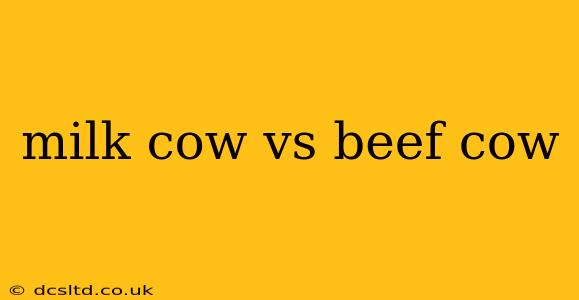Choosing between a milk cow and a beef cow depends entirely on your goals. Are you looking for a steady supply of fresh milk, or are you aiming to raise cattle for meat? Understanding the key distinctions between these two types of cows is crucial for making the right decision. This comprehensive guide will explore the significant differences in breed, temperament, milk production, meat yield, and overall care requirements.
What is the difference between a milk cow and a beef cow?
The most fundamental difference lies in their breeding and purpose. Dairy cows are selectively bred for their high milk production capabilities. Their genetics are optimized for lactation, resulting in significantly higher milk yields compared to beef cattle. Beef cows, on the other hand, are bred primarily for meat production. Their genetics focus on muscle growth, carcass quality, and efficient feed conversion. This means they generally produce less milk, and that milk is primarily for their calves.
What are the characteristics of a milk cow?
Dairy cows are characterized by several key features that distinguish them from their beef counterparts.
- Breed: Common dairy breeds include Holstein Friesian (known for high milk volume), Jersey (known for high butterfat content), Guernsey, and Brown Swiss. Each breed possesses unique characteristics impacting milk yield and composition.
- Body Shape: Dairy cows typically have a leaner build, deeper bodies, and more prominent udders compared to beef cattle. Their frames are designed for efficient milk production, not for maximizing meat yield.
- Temperament: Generally, dairy cows are more docile and easier to handle than some beef breeds, particularly those bred for extensive grazing. However, individual temperaments can vary greatly depending on factors such as handling and genetics.
- Milk Production: This is the defining characteristic. High-producing dairy cows can yield tens of thousands of liters of milk annually. The composition of the milk (butterfat, protein, etc.) also varies across breeds.
What are the characteristics of a beef cow?
Beef cows are specifically bred for meat production and exhibit distinct traits:
- Breed: Popular beef breeds include Angus (known for marbling and tenderness), Hereford, Simmental, and Charolais. Each breed offers unique characteristics influencing meat quality and growth rate.
- Body Shape: Beef cows are typically larger and more muscular than dairy cows, with a wider build designed for efficient muscle growth. Their frames are optimized for meat yield and carcass quality.
- Temperament: Beef breeds can vary in temperament, with some being more docile while others are more independent and less easily handled. Certain breeds are known for being more aggressive than others.
- Milk Production: While beef cows do produce milk to nourish their calves, the quantity is considerably less than that of dairy cows. The milk is typically not intended for human consumption.
What type of cow is best for milk production?
For optimal milk production, dairy cows are the clear choice. Their genetics, body structure, and physiology are specifically designed for maximizing milk yield and composition.
What type of cow is best for meat production?
For meat production, beef cows are the superior option. Their genetics are focused on muscle growth, carcass quality, and efficient feed conversion, resulting in a higher-quality and more abundant meat yield.
How much milk does a milk cow produce?
The amount of milk a dairy cow produces depends on several factors, including breed, genetics, nutrition, management practices, and stage of lactation. High-producing cows can yield anywhere from 8,000 to 12,000 kilograms of milk annually.
How much meat does a beef cow produce?
The amount of meat produced from a beef cow depends on factors like breed, age, and feeding management. A typical beef cow can produce several hundred pounds of meat.
What is the cost of raising a milk cow vs. a beef cow?
The cost of raising either type of cow varies based on several factors including feed costs, veterinary care, housing, and labor. Dairy cows often require more specialized care and feed due to their higher milk production demands.
This comparison provides a general overview of milk cows versus beef cows. The ideal choice depends heavily on individual circumstances and goals. Consulting with experienced farmers or agricultural specialists can provide personalized guidance based on your specific needs and resources.
